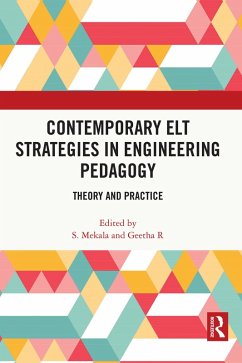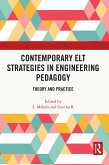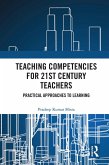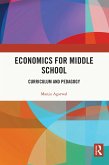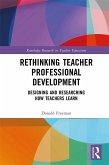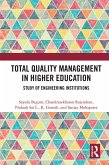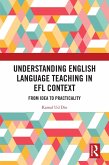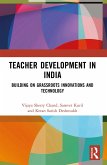Contemporary ELT Strategies in Engineering Pedagogy (eBook, PDF)
Theory and Practice
Redaktion: Mekala, S.; R, Geetha
43,95 €
43,95 €
inkl. MwSt.
Sofort per Download lieferbar

22 °P sammeln
43,95 €
Als Download kaufen

43,95 €
inkl. MwSt.
Sofort per Download lieferbar

22 °P sammeln
Jetzt verschenken
Alle Infos zum eBook verschenken
43,95 €
inkl. MwSt.
Sofort per Download lieferbar
Alle Infos zum eBook verschenken

22 °P sammeln
Contemporary ELT Strategies in Engineering Pedagogy (eBook, PDF)
Theory and Practice
Redaktion: Mekala, S.; R, Geetha
- Format: PDF
- Merkliste
- Auf die Merkliste
- Bewerten Bewerten
- Teilen
- Produkt teilen
- Produkterinnerung
- Produkterinnerung

Bitte loggen Sie sich zunächst in Ihr Kundenkonto ein oder registrieren Sie sich bei
bücher.de, um das eBook-Abo tolino select nutzen zu können.
Hier können Sie sich einloggen
Hier können Sie sich einloggen
Sie sind bereits eingeloggt. Klicken Sie auf 2. tolino select Abo, um fortzufahren.

Bitte loggen Sie sich zunächst in Ihr Kundenkonto ein oder registrieren Sie sich bei bücher.de, um das eBook-Abo tolino select nutzen zu können.
This book explores innovative pedagogical practices and teaching and learning strategies in the engineering curriculum for empowered learning.
- Geräte: PC
- mit Kopierschutz
- eBook Hilfe
Andere Kunden interessierten sich auch für
![Contemporary ELT Strategies in Engineering Pedagogy (eBook, ePUB) Contemporary ELT Strategies in Engineering Pedagogy (eBook, ePUB)]() Contemporary ELT Strategies in Engineering Pedagogy (eBook, ePUB)43,95 €
Contemporary ELT Strategies in Engineering Pedagogy (eBook, ePUB)43,95 €![Teaching Competencies for 21st Century Teachers (eBook, PDF) Teaching Competencies for 21st Century Teachers (eBook, PDF)]() Pradeep Kumar MisraTeaching Competencies for 21st Century Teachers (eBook, PDF)41,95 €
Pradeep Kumar MisraTeaching Competencies for 21st Century Teachers (eBook, PDF)41,95 €![Economics for Middle School (eBook, PDF) Economics for Middle School (eBook, PDF)]() Manju AgarwalEconomics for Middle School (eBook, PDF)43,95 €
Manju AgarwalEconomics for Middle School (eBook, PDF)43,95 €![Rethinking Teacher Professional Development (eBook, PDF) Rethinking Teacher Professional Development (eBook, PDF)]() Donald FreemanRethinking Teacher Professional Development (eBook, PDF)40,95 €
Donald FreemanRethinking Teacher Professional Development (eBook, PDF)40,95 €![Total Quality Management in Higher Education (eBook, PDF) Total Quality Management in Higher Education (eBook, PDF)]() Sayeda BegumTotal Quality Management in Higher Education (eBook, PDF)45,95 €
Sayeda BegumTotal Quality Management in Higher Education (eBook, PDF)45,95 €![Understanding English Language Teaching in EFL Context (eBook, PDF) Understanding English Language Teaching in EFL Context (eBook, PDF)]() Kamal Ud DinUnderstanding English Language Teaching in EFL Context (eBook, PDF)41,95 €
Kamal Ud DinUnderstanding English Language Teaching in EFL Context (eBook, PDF)41,95 €![Teacher Development in India (eBook, PDF) Teacher Development in India (eBook, PDF)]() Vijaya Sherry ChandTeacher Development in India (eBook, PDF)41,95 €
Vijaya Sherry ChandTeacher Development in India (eBook, PDF)41,95 €-
-
-
This book explores innovative pedagogical practices and teaching and learning strategies in the engineering curriculum for empowered learning.
Dieser Download kann aus rechtlichen Gründen nur mit Rechnungsadresse in A, B, BG, CY, CZ, D, DK, EW, E, FIN, F, GR, HR, H, IRL, I, LT, L, LR, M, NL, PL, P, R, S, SLO, SK ausgeliefert werden.
Produktdetails
- Produktdetails
- Verlag: Taylor & Francis
- Seitenzahl: 318
- Erscheinungstermin: 17. März 2022
- Englisch
- ISBN-13: 9781000546033
- Artikelnr.: 63617060
- Verlag: Taylor & Francis
- Seitenzahl: 318
- Erscheinungstermin: 17. März 2022
- Englisch
- ISBN-13: 9781000546033
- Artikelnr.: 63617060
- Herstellerkennzeichnung Die Herstellerinformationen sind derzeit nicht verfügbar.
S. Mekala is an Associate Professor and Head in the Department of Humanities and Social Sciences at National Institute of Technology, Tiruchirappalli, India. Geetha R is a research scholar who completed her PhD research focusing on the augmentation of learners' writing skill, in the Department of Humanities and Social Sciences at National Institute of Technology, Tiruchirappalli, India.
List of Figures. List of Tables. List of Contributors. Preface.
Acknowledgements. Part I: Developing competency and skills 1. Need for
remodeling the engineering curriculum 2. Integrated practice of learning
strategies in the engineering curriculum Part II: Communication Skills 3.
Bridging the Skills Gap in Technical Education 4. Task-based language
teaching to foster greater communication skills Part III: Listening,
Speaking, Reading and Writing Skills 5. Teaching LSRW Skills through the
Test, Teach, Test (TTT) Method 6. Integrating the Sub-skills of LSWR for
ESL Learners Part IV: English for Specific Purposes (ESP) 7. Value Addition
to the Communication Course 8. Poetry in the Engineering Curriculum 9.
Incorporating Thinking Skills in the Engineering Curriculum Part V:
Approaches and Strategies 10. Pedagogical strategies in improving ESL
learners' speaking proficiency 11. Teaching speaking in Indian ESL
classrooms 12. Improving reading proficiency in ESL learners Part VI:
Digital Education 13. Techno-mediated teaching of English for engineers:
perceived threats and hidden opportunities 14. Integration of Zone of
proximal development (ZPD) and ICTs in language learning Part VII: Teacher
Education 15. Towards designing a module for INSET 16. Reflective practice
for teachers in the post-method era. Appendix A and B. Index.
Acknowledgements. Part I: Developing competency and skills 1. Need for
remodeling the engineering curriculum 2. Integrated practice of learning
strategies in the engineering curriculum Part II: Communication Skills 3.
Bridging the Skills Gap in Technical Education 4. Task-based language
teaching to foster greater communication skills Part III: Listening,
Speaking, Reading and Writing Skills 5. Teaching LSRW Skills through the
Test, Teach, Test (TTT) Method 6. Integrating the Sub-skills of LSWR for
ESL Learners Part IV: English for Specific Purposes (ESP) 7. Value Addition
to the Communication Course 8. Poetry in the Engineering Curriculum 9.
Incorporating Thinking Skills in the Engineering Curriculum Part V:
Approaches and Strategies 10. Pedagogical strategies in improving ESL
learners' speaking proficiency 11. Teaching speaking in Indian ESL
classrooms 12. Improving reading proficiency in ESL learners Part VI:
Digital Education 13. Techno-mediated teaching of English for engineers:
perceived threats and hidden opportunities 14. Integration of Zone of
proximal development (ZPD) and ICTs in language learning Part VII: Teacher
Education 15. Towards designing a module for INSET 16. Reflective practice
for teachers in the post-method era. Appendix A and B. Index.
List of Figures. List of Tables. List of Contributors. Preface.
Acknowledgements. Part I: Developing competency and skills 1. Need for
remodeling the engineering curriculum 2. Integrated practice of learning
strategies in the engineering curriculum Part II: Communication Skills 3.
Bridging the Skills Gap in Technical Education 4. Task-based language
teaching to foster greater communication skills Part III: Listening,
Speaking, Reading and Writing Skills 5. Teaching LSRW Skills through the
Test, Teach, Test (TTT) Method 6. Integrating the Sub-skills of LSWR for
ESL Learners Part IV: English for Specific Purposes (ESP) 7. Value Addition
to the Communication Course 8. Poetry in the Engineering Curriculum 9.
Incorporating Thinking Skills in the Engineering Curriculum Part V:
Approaches and Strategies 10. Pedagogical strategies in improving ESL
learners' speaking proficiency 11. Teaching speaking in Indian ESL
classrooms 12. Improving reading proficiency in ESL learners Part VI:
Digital Education 13. Techno-mediated teaching of English for engineers:
perceived threats and hidden opportunities 14. Integration of Zone of
proximal development (ZPD) and ICTs in language learning Part VII: Teacher
Education 15. Towards designing a module for INSET 16. Reflective practice
for teachers in the post-method era. Appendix A and B. Index.
Acknowledgements. Part I: Developing competency and skills 1. Need for
remodeling the engineering curriculum 2. Integrated practice of learning
strategies in the engineering curriculum Part II: Communication Skills 3.
Bridging the Skills Gap in Technical Education 4. Task-based language
teaching to foster greater communication skills Part III: Listening,
Speaking, Reading and Writing Skills 5. Teaching LSRW Skills through the
Test, Teach, Test (TTT) Method 6. Integrating the Sub-skills of LSWR for
ESL Learners Part IV: English for Specific Purposes (ESP) 7. Value Addition
to the Communication Course 8. Poetry in the Engineering Curriculum 9.
Incorporating Thinking Skills in the Engineering Curriculum Part V:
Approaches and Strategies 10. Pedagogical strategies in improving ESL
learners' speaking proficiency 11. Teaching speaking in Indian ESL
classrooms 12. Improving reading proficiency in ESL learners Part VI:
Digital Education 13. Techno-mediated teaching of English for engineers:
perceived threats and hidden opportunities 14. Integration of Zone of
proximal development (ZPD) and ICTs in language learning Part VII: Teacher
Education 15. Towards designing a module for INSET 16. Reflective practice
for teachers in the post-method era. Appendix A and B. Index.
